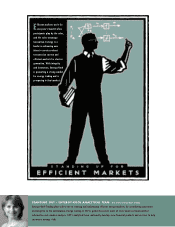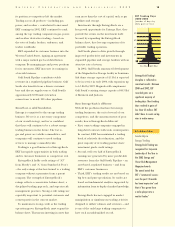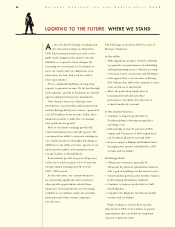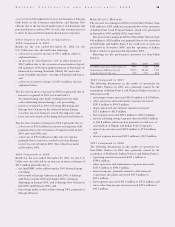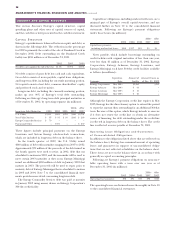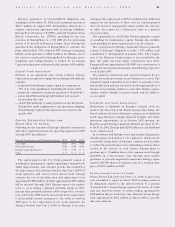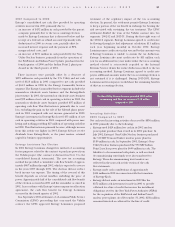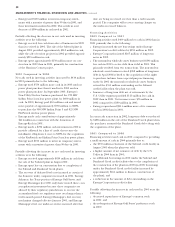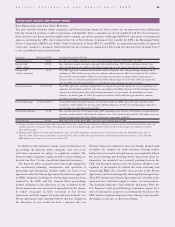Entergy 2002 Annual Report Download - page 28
Download and view the complete annual report
Please find page 28 of the 2002 Entergy annual report below. You can navigate through the pages in the report by either clicking on the pages listed below, or by using the keyword search tool below to find specific information within the annual report.
ENERGY COMMODITY SERVICES
The decrease in earnings for Energy Commodity Services in
2002 from $106 million to a $146 million loss was primarily due
to the impairment charges that are discussed below.
The increase in earnings for Energy Commodity Services in
2001 from $55 million to $106 million was primarily due to the
strong performance of the trading and gas pipeline businesses
of Entergy-Koch.
2002 Compared to 2001
The decrease in earnings for Energy Commodity Services in
2002 was primarily due to the charges to reflect the effect of
Entergy’s decision to discontinue additional greenfield power
plant development and to reflect asset impairments resulting
from the deteriorating economics of wholesale power markets
principally in the United States and the United Kingdom.
Entergy recorded net charges of $428.5 million ($238.3 million
net of tax) to operating expenses. The net charges consist of
the following:
The power development business obtained contracts in
October 1999 to acquire 36 turbines from General Electric.
Entergy’s rights and obligations under the contracts for 22
of the turbines were sold to an independent special-purpose
entity in May 2001. $178.0 million of the charges, including
an offsetting net of tax benefit of $18.5 million related to
the subsequent sale of four turbines to a third party, is a
provision for the net costs resulting from cancellation or
sale of the turbines subject to purchase commitments with
the special-purpose entity.
$204.4 million of the charges results from the write-off of
Entergy Power Development Corporation’s equity invest-
ment in the Damhead Creek project and the impairment
of the values of its Warren Power power plant and its Crete
and RS Cogen projects. This portion of the charges
reflects Entergy’s estimate of the effects of reduced spark
spreads in the United States and the United Kingdom.
Damhead Creek was sold in December 2002, resulting in
an after-tax gain of $31.4 million.
$39.1 million of the charges relates to the restructuring of
the non-nuclear wholesale assets business, and is comprised
of $22.5 million of impairments of administrative fixed
assets, $10.7 million of estimated sublease losses, and
$5.9 million of employee-related costs.
$32.7 million of the charges results from the write-off of
capitalized project development costs for projects that will
not be completed.
A gain of $25.7 million ($15.9 million net of tax) was
realized on the sale in August 2002 of an interest in
projects under development in Spain.
Also, in the first quarter of 2002, Energy Commodity
Services sold its interests in projects in Argentina, Chile, and
Peru for net proceeds of $135.5 million. After impairment
provisions recorded for these Latin American interests in
2001, the net loss realized on the sale in 2002 is insignificant.
Revenues and fuel and purchased power expenses
decreased for Energy Commodity Services by $1,075.8 million
and $876.9 million, respectively, in 2002 primarily due to:
a decrease of $542.9 million in revenues and $539.6 million
in fuel and purchased power expenses resulting from the
sale of Highland Energy in the fourth quarter of 2001;
a decrease of $161.7 million in revenues resulting from the
sale of the Saltend plant in August 2001; and
a decrease of $139.1 million in revenues and $133.5 million
in purchased power expenses due to the contribution of
substantially all of Entergy’s power marketing and trading
business to Entergy-Koch in February 2001. Earnings from
Entergy-Koch are reported as equity in earnings of uncon-
solidated equity affiliates in the financial statements. The
net income effect of the lower revenues was more than
offset by the income from Entergy’s investment in Entergy-
Koch. The income from Entergy’s investment in Entergy-
Koch was $31.9 million higher in 2002 primarily as a result
of earnings at Entergy-Koch Trading (EKT) and higher
earnings at Gulf South Pipeline due to more favorable
transportation contract pricing. Although the gain/loss
days ratio reported below declined in 2002, EKT made
relatively more money on the gain days than the loss days,
and thus had an increase in earnings for the year.
Following are key performance measures for Entergy-
Koch’s operations for 2002 and 2001:
2002 2001
Entergy-Koch Trading
Gas volatility 61% 72%
Electricity volatility 48% 78%
Gas marketed (BCF/D)(1) 5.8 3.0
Electricity marketed (GWh)(1) 408,038 180,893
Gain/loss days 1.8 2.8
Gulf South Pipeline
Throughput (BCF/D) 2.40 2.45
Production cost ($/MMBtu) $0.094 $0.093
(1) Previously reported volumes, which included only U.S. trading, have been
adjusted to reflect both U.S. and Europe volumes traded.
Entergy accounts for its 50% share in Entergy-Koch under the
equity method of accounting. Certain terms of the partnership
arrangement allocate income from various sources, and the
taxes on that income, on a significantly disproportionate basis
through 2003. Losses and distributions from operations are
allocated to the partners equally. Substantially all of Entergy-
Koch’s profits were allocated to Entergy in 2002. Effective
January 1, 2004, a revaluation of Entergy-Koch’s assets for legal
capital account purposes will occur, and future profit allocations
will change after the revaluation. The profit allocations other
than for weather trading and international trading are expected
to become equal, unless special allocations are necessary to
MANAGEMENT’S FINANCIAL DISCUSSION AND ANALYSIS continued
26




